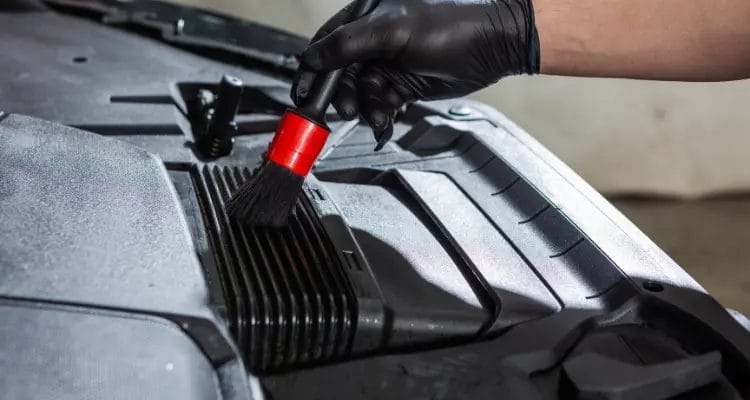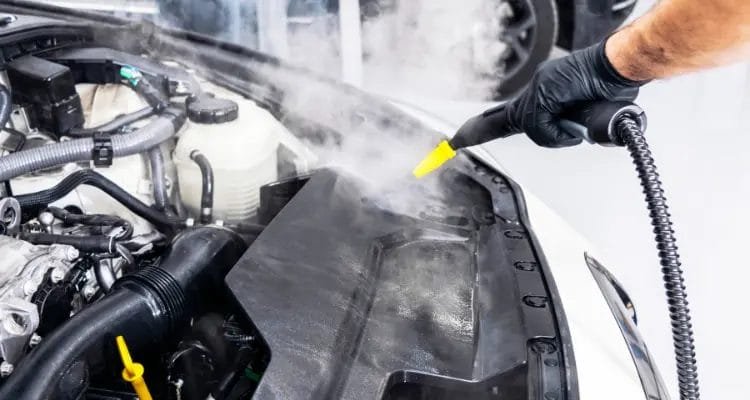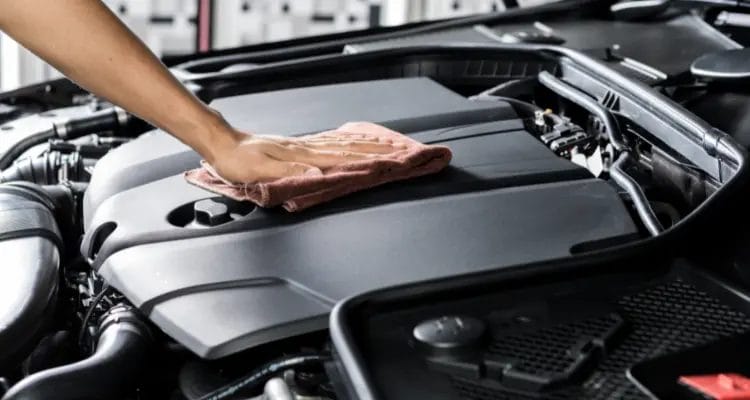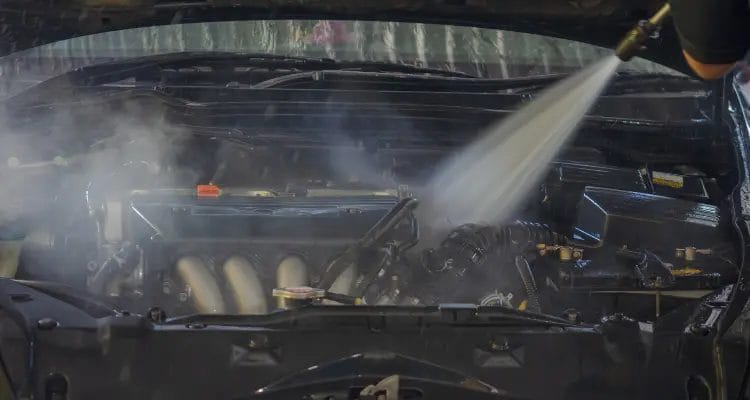Maintaining a clean engine is not merely an aesthetic pursuit; it’s a fundamental aspect of responsible car ownership that can extend the lifespan and optimize the performance of your vehicle. When it comes to engine cleaning, doing it the right way is crucial to prevent damage to sensitive components and ensure the longevity of your automobile.
In this guide, we will explore the proper techniques for cleaning your engine, emphasizing a meticulous approach that prioritizes safety and effectiveness. Contrary to common misconceptions, cleaning your engine does not require a water cannon or abrasive scrubbing. Instead, we will delve into a method that eschews water entirely, minimizing the risk of electrical damage and corrosion.

Can you clean an engine without water?
It is possible to clean an engine without water, but it’s not advisable. The main advantage of using water to clean an engine is that it helps to flush away dirt and grease. Engine degreaser can be used to substitute for water, and it will help to loosen the dirt and grease.
However, it’s important to note that engine degreasers can harm the paintwork on a car, so it’s important to take care when using them. Another alternative is to use a vacuum cleaner with a brush attachment; this will help to remove the dirt and grease without causing any damage.
Also Read: How To Remove Hard Water Spots From Car Paint?

7 Ways to Clean Your Engine: No Water, No Scrubbing
Cleaning your engine without using water or scrubbing is a delicate process that requires some careful steps to avoid damaging sensitive components. This method is best for light to moderate cleaning and should not be used if your engine is heavily caked with dirt or grease. Here’s how you can clean your engine without water or scrubbing:
Materials you’ll need:
- Engine Degreaser: Choose a high-quality, water-based engine degreaser. Avoid harsh chemicals that can damage the engine components.
- Plastic Bags or Plastic Wrap: Use these to cover sensitive electrical components, such as the alternator, battery, fuse box, and air intake.
- Brush or Soft Bristle Brush: You’ll use this for gently agitating the degreaser and loosening dirt and grime.
- Rags or Microfiber Towels: For wiping off the degreaser and dirt.
- Compressed Air or Leaf Blower: To blow away loosened dirt and degreaser residue.
- Protective Gear: Wear gloves and safety goggles to protect your hands and eyes.
Steps:

- Prepare the Engine: Make sure the engine is cool to the touch before you begin. Disconnect the battery to prevent accidental electrical shorts. Cover sensitive components with plastic bags or plastic wrap. Ensure all caps and openings are tightly sealed.
- Apply Engine Degreaser: Liberally spray the engine degreaser over the entire engine bay, paying special attention to the dirtiest areas. Allow the degreaser to sit for the recommended time specified on the product label. This usually ranges from 5 to 15 minutes.
- Agitate with a Brush: Use a soft bristle brush to agitate the degreaser on the engine’s surfaces gently. This helps break up the grime and oil.
- Wipe Off: After agitating, use rags or microfiber towels to wipe away the degreaser and loosened dirt. Be gentle to avoid scratching or damaging any components.
- Blow Away Residue: Use compressed air or a leaf blower on a low setting to blow away any remaining residue and waterless engine cleaner. Start from the top and work your way down.
- Inspect and Reassemble: Inspect the engine bay to ensure all residue is removed. If necessary, repeat the process in areas that are still dirty. Once satisfied, remove the plastic coverings from sensitive components and reassemble any parts you may have removed.
- Reconnect Battery: Reconnect the battery, and you’re done.
Remember to follow the instructions on the specific engine degreaser you use, as different products may have slightly different application and waiting times. Additionally, avoid using high-pressure water or strong streams of water on your engine, as it can force water into electrical components and cause damage. This method is intended for light to moderate cleaning; for heavy-duty cleaning, a professional service may be necessary.
Is it a good idea to wash your car engine without water?
Yes, it is a good idea to wash your car engine without water. Water can damage your engine by causing corrosion and rust. It can also cause electrical problems. So if you want to avoid all of those potential problems, it’s best to clean your engine without water.
How often should you clean your car engine?
Ideally, you should clean your car engine every few months. But if you live in a particularly dusty or dirty area, you may need to do it more often. You should also clean your engine after driving on unpaved roads or in heavy rainstorms.

How do I know if my car needs an engine cleaning?
Determining whether your car needs an engine cleaning can depend on several factors, including the appearance of your engine bay, your driving habits, and how long it’s been since your last engine cleaning. Here are some signs that may indicate it’s time for an engine cleaning:
- Visible Dirt and Grime: The most obvious sign is a dirty engine bay. If you pop the hood and see a layer of dirt, grease, or oil covering various engine components, it’s a good indication that your engine could benefit from a cleaning.
- Reduced Engine Performance: If you notice a decrease in your car’s performance, such as reduced fuel efficiency or sluggish acceleration, it might be due to dirt and grime buildup in critical areas like the air intake or sensors.
- Strange Odors or Smoke: A buildup of oil and debris can sometimes lead to unusual smells or even smoke emanating from the engine bay. This could indicate that contaminants are getting heated up or burning.
- Overheating Issues: An excessively dirty engine can obstruct proper airflow and cooling, potentially leading to overheating problems. If your car tends to run hotter than usual, it might be time for a cleaning.
- Visible Fluid Leaks: If you spot fluid leaks or drips in the engine bay, cleaning the area can help you identify the source of the leak more easily.
- Maintenance Schedule: Regular engine cleaning can be part of your car’s maintenance routine. Check your owner’s manual for recommendations on how often it should be done. Some manufacturers suggest cleaning the engine bay every 12,000 to 24,000 miles or once a year.
- Environmental Factors: If you live in an area with extreme weather conditions, such as frequent salt exposure in winter or dusty conditions in a desert environment, you may need more frequent engine cleanings to prevent corrosion and damage.
It’s important to note that while regular engine cleaning can be beneficial, it should be done carefully to avoid damaging sensitive components. If you’re unsure about whether your car needs an engine cleaning or how to perform one safely, consider consulting your car’s manufacturer guidelines or seeking professional assistance from a mechanic or auto detailing service.

What happens if you wash your car engine with water?
If you’re talking about simply using water to rinse off your car engine (and not using any soaps or cleaners), there’s no harm in doing this.
However, if you use a pressure washer to clean the engine, be careful not to spray directly at sensitive electrical components like the alternator or engine sensors. Water could get into these components and cause damage. Instead, if you’re using a hose, hold it back a few feet from these components when rinsing the engine.
Frequently Asked Questions:
How do you clean under the hood without water?
Is waterless wash good for the car?
Why shouldn’t you use the hose to wash your car?
What will happen if I never wash my car?
What time of day is best to wash your car?
Conclusion
Now that you know how to clean your engine correctly, remove all the dirt and grime from it. You don’t need any water or scrubbing for this. Once you are done with cleaning, apply a few drops of oil to keep it running smoothly. Use a new paper filter when replacing the spark plug as well.






